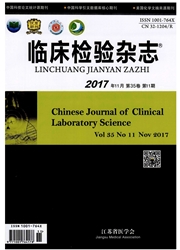

 中文摘要:
中文摘要:
目的探讨白血病细胞株(K562)来源的外体(exosomes)对人脐带间充质干细胞(human umbilical cord mesenchymal stemcells,hucMSCs)的影响。方法用离心超滤和蔗糖密度梯度超速离心法从K562细胞的培养上清液中分离并纯化exosomes。透射电子显微镜观察其形态;将exosomes与hucMSCs共育,细胞计数板法检测exosomes对hucMSCs增殖的影响;实时荧光定量PCR检测肿瘤相关成纤维细胞(CAFs)相关基因FAP、α-SMA和IL-6的表达;western blot检测exosomes标志性蛋白CD9、CD81及CAFs相关蛋白FAP,α-SMA的表达。结果透射电镜下观察分离的exosomes呈椭圆或碟状的囊泡结构,直径在30~100 nm;细胞计数板法检测结果表明,不同浓度的exosomes均能抑制hucMSCs细胞增殖且呈剂量依赖性(P均〈0.05);荧光定量PCR结果表明,不同浓度的exosomes作用于hucMSCs,其FAP、α-SMA和IL-6表达量明显增加(P均〈0.05);western blot结果表明,exosomes可表达标志性蛋白CD9、CD81,且exosomes作用hucMSCs后FAP、α-SMA蛋白表达量增加。结论 K562细胞来源的exosomes能抑制hucMSCs增殖,且能诱导hucMSCs向CAFs的分化。
 英文摘要:
英文摘要:
Objective To investigate the effects of exosomes released from chronic myeloid leukemia K562 cells on human umbilical cord mesenchymal stem cells (hucMSCs). Methods The exosomes were extracted and purified from the supernatant of K562 cell culture with ultrafihration and sucrose density gradient uhracentrifugation. The morphology of the exosomes was observed by transmission electron microscope (TEM). The effect of exosomes on the proliferation of hucMSCs was determined by eytometry after co-incubating exosomes with hucMSCs. The expressions of FAP, α-SMA and 1L-6 genes in carcinoma-associated fibroblasts (CAFs) were analyzed with real-time fluorescence quantitative PCR (qRT-PCR) , and the levels of CD9, CD81, FAP and ct-SMA were determined by Western blot. Results The exosome exhibited elliptic or saucer-like vesicle with membrane structure under TEM and its diameter ranged from 30 to 100 nm. The proliferations of hucMSCs were inhibited by different concentrations of exosomes with a dose-dependent manner ( P 〈 0.05 ). qRT-PCR showed that the levels of FAP, α-SMA and IL-6 expression in hucMSCs treated with different eoneerntrations of exosomes were increased significantly ( P 〈 0.05 ). Western blot analysis also showed that the exosomes expressed the markers as CD9 and CD81, and the levels of FAP and α-SMA in hucMSCs treated with exosomes were increased significantly. Conclusion The exosomes released from K562 cells may inhibit the proliferation of hucMSCs in vitro, and promote the differentiation of hucMSCs to CAFs.
 同期刊论文项目
同期刊论文项目
 同项目期刊论文
同项目期刊论文
 Hepatocyte growth factor modified human umbilical cord mesenchymal stem cells accelerate the recover
Hepatocyte growth factor modified human umbilical cord mesenchymal stem cells accelerate the recover miR-17-5p/20a are important markers for gastric cancer and murine double minute 2 participates in th
miR-17-5p/20a are important markers for gastric cancer and murine double minute 2 participates in th H. pylori infection-induced MSC differentiation into CAFs promotes epithelial-mesenchymal transition
H. pylori infection-induced MSC differentiation into CAFs promotes epithelial-mesenchymal transition Activation of Mesenchymal Stem Cells by Macrophages Prompts Human Gastric Cancer Growth through NF-k
Activation of Mesenchymal Stem Cells by Macrophages Prompts Human Gastric Cancer Growth through NF-k Experimental Therapy for Lung Cancer: Umbilical Cord-Derived Mesenchymal Stem Cell-Mediated Interleu
Experimental Therapy for Lung Cancer: Umbilical Cord-Derived Mesenchymal Stem Cell-Mediated Interleu 期刊信息
期刊信息
